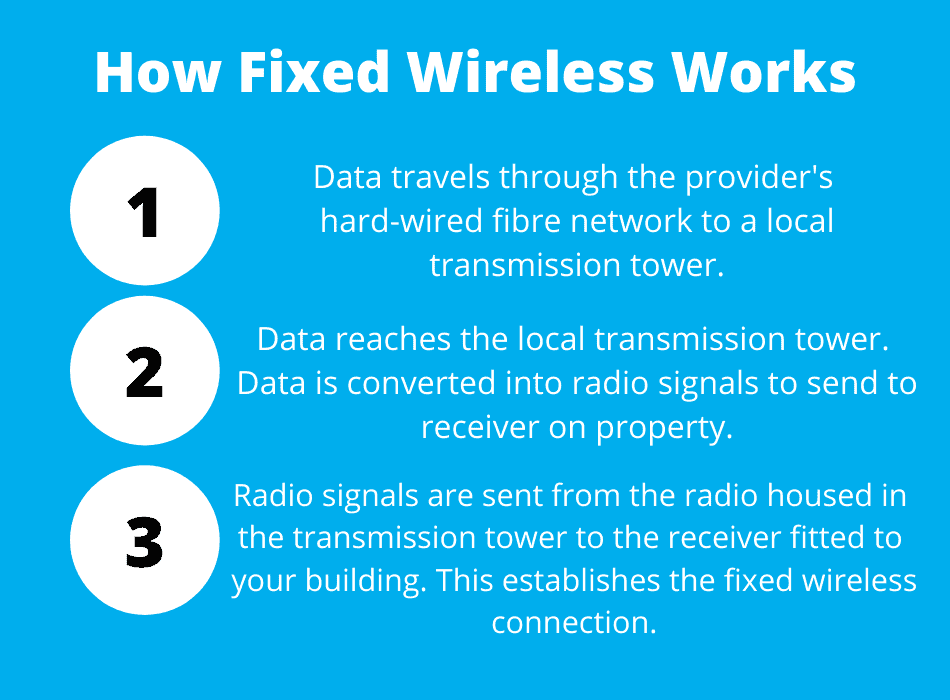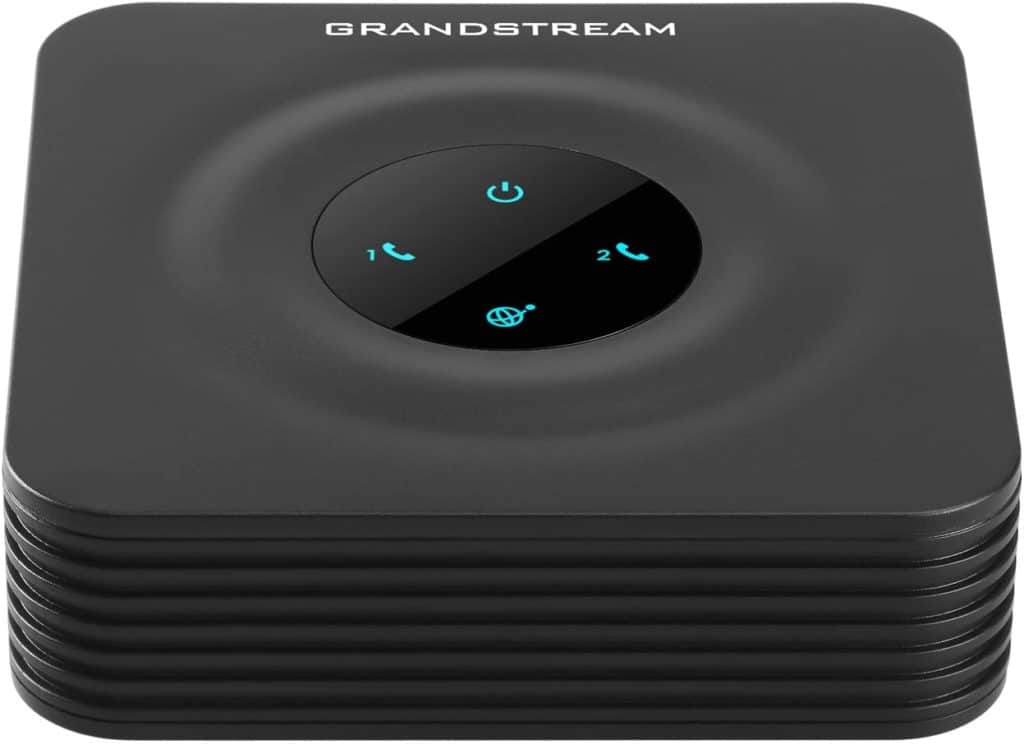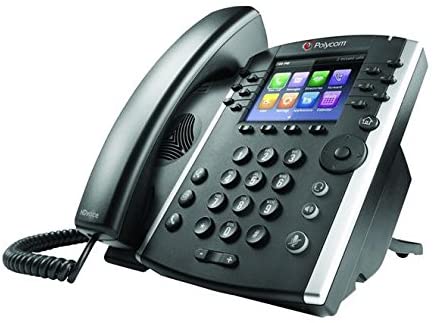Do you live in a rural area where superfast cabled broadband connections are unavailable? A fixed wireless connection could offer your business superfast speeds without the need for any cables. It might sound too good to be true, but it isn’t. Here’s how it all works.
How does fixed wireless internet work? Fixed wireless uses radio signals to establish a connection. Fixed wireless uses transmission masts housing radios that send signals to a receiver fitted to the customer’s building.
Answering how fixed wireless internet works in one sentence is a challenge, so I’m going to explain how everything works in more detail. Read on for my guide on how fixed wireless internet works, as well as some explanations on its reliability and the speeds you could enjoy.
How Does Fixed Wireless Work?
So we know that a fixed wireless connection is created using radio signals rather than cables. But how does all this work?

As you can see from the image above, data first travels through the provider’s hard-wired fibre network to a local transmission tower. This local transmission tower contains advanced radio technology that will be used to create a point-to-point connection with your property.
At the transmission tower, data is converted into radio signals. The radio technology housed in the transmission tower then transmits these radio signals to the receiver fitted onto your property. This establishes a point-to-point connection between your receiver and the transmission tower. Once the link is created, a superfast broadband service can be set up for your property.
To provide your property with a broadband service, a cable will carry the radio signals from the receiver to the router in your property. At this point, the connection is fully established and you will have internet access in your property.
Is Fixed Wireless Internet Reliable?
Does it all sound too good to be true, that you could have superfast speeds for your property without the expense and hassle of installing a physical connection? Many have concerns about the reliability of a fixed wireless connection because there’s no physical connection. Thankfully, these concerns are unfounded as fixed wireless internet is reliable. You really do get the speeds you’re paying for too!
Is Fixed Wireless More Reliable Than Satellite Internet Or Cellular?
Those unaware of the intricacies of fixed wireless often think it’s just as unreliable as satellite internet or cellular. While it’s true that satellite internet and cellular can be unreliable, the same cannot be said for fixed wireless broadband.
With satellite internet, you’re at the mercy on the weather. A storm miles away from your location can cause interference and cause your internet to drop. Mobile broadband is completely wireless and speeds differ greatly depending on your location and the infrastructure surrounding you. These are problems you don’t have to worry about with fixed wireless.
Weather can have an impact on a fixed wireless connection. Conditions such as strong winds or thick fog can impact the reliability of your connection. However, your connection is relatively free from interference for the most part, particularly when compared with mobile broadband and satellite internet. Your connection will remain reliable even when the weather’s poor. This is because fixed wireless towers are land-based, so clouds and rain are unlikely to cause interference. The radio signals only travel a short distance compared to satellite internet, so weather conditions miles away won’t have any impact on your connection.
How Does Fixed Wireless Broadband Reliability Compare With Physical Connections?
It’s hard to compare the reliability of fixed wireless connections and physical connections, primarily because both are pretty reliable.
Physical connections are extremely reliable for the most part. For example, you aren’t going to experience outages due to factors like bad weather. However, all it takes is a construction worker to accidentally dig through a cable and your connection could be down for hours, if not days. That’s obviously not a problem you’ll have with fixed wireless internet, as there are no cables to cut through. On the other hand, severe weather conditions can impact the reliability of the connection.
When comparing the reliability of fixed wireless and physical connections, we have to consider how natural and human-made obstructions can impact the reliability of wireless internet. For the most part, wireless technology has evolved to the point where a connection can still be established even if something such as a tree interrupts the point-to-point connection. However, if there’s a hill or a large building between the transmission mast and your location, it will be challenging to establish a reliable, superfast connection.
There’s no winner when comparing the reliability of fixed wireless broadband and physical connections. Both are reliable, but both are also at the mercy of different factors that can impact reliability. If you’re in a rural location, you don’t really have a choice between fixed wireless and a physical connection anyway.
Is Fixed Wireless Internet Secure?
When discussing how fixed wireless internet works, many wonder whether the technology used and the nature of a wireless connection allows for robust security. Can the signals be intercepted? Can the technology be impacted by hackers?
Is fixed wireless internet secure? Yes, fixed wireless internet is just as secure as the other types of internet service available, such as fibre, DSL and satellite. In fact, some experts suggest that fixed wireless internet may be more secure than the other types of internet service available.
It’s important to note that while fixed wireless internet is secure, it isn’t completely secure. The security isn’t perfect. In fact, there’s no perfect security when it comes to internet connections. However, providers have invested heavily in making sure their fixed wireless offerings are secure.
How Is Fixed Wireless Internet Secured?
Providers are serious about ensuring the security of their fixed wireless internet connections. As with other types of internet available, here are some of the layers of protection in place on a fixed wireless connection:
- Encryption
- Authentication
- Access Control
ISPs have several security strategies in action that ensure the connection from the transmission tower to your property remains secure. Data can be encrypted before being sent, meaning in the unlikely occasion that data is intercepted, it’s worthless to the interceptor. In addition to encryption, ISPs work tirelessly to ensure the security of their primary network with security solutions such as authentication and access control.
When establishing your fixed wireless connection, reliable providers will use wireless components that are not designed for open access. By using components designed to be secure, data transmissions take place without the chance of interception by anyone between the two endpoints exchanging data.
Of course, the security precautions taken by your provider are useless if you don’t secure your own network. You need to take the necessary precautions locally to ensure that your network is secure. For example, ensure only authorised personnel have access to your network infrastructure. Additionally, make sure you use antivirus on all your devices accessing the network and create a robust plan for keeping your passwords and login details safe.



